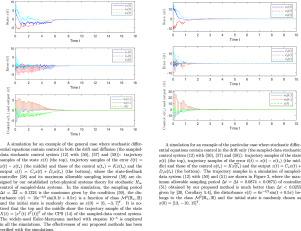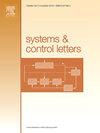采样数据系统随机线性二次控制的信息物理系统反馈稳定性
IF 2.5
3区 计算机科学
Q3 AUTOMATION & CONTROL SYSTEMS
引用次数: 0
摘要
反馈镇定性在无限视界随机线性二次控制问题中起着关键作用。当控制律被离散化并在采样器和零阶保持装置上实现时,如何保持采样数据系统中随机微分方程(其中漂移和扩散都包含控制)的反馈稳定性是一个关键问题,然而,这个问题很少得到解决。采样数据控制系统是一类典型的网络物理系统(CPS)。为了解决这一关键问题,我们建立了抽样数据随机系统反馈稳定性的CPS理论。基于反馈稳定性,我们进一步发展了抽样数据系统随机H∞控制的CPS理论。应用CPS理论,提出了一种适用于采样数据随机系统的H∞控制设计方法。数值算例验证了所提方法的有效性。通过我们的CPS理论,我们开始了抽样数据系统的SLQ问题的研究,这引起了许多有趣的问题。本文章由计算机程序翻译,如有差异,请以英文原文为准。

Feedback stabilizability of cyber–physical systems for stochastic linear-quadratic control of sampled-data systems
Feedback stabilizability plays a pivotal role in stochastic linear-quadratic (SLQ) control problems in infinite horizon. A key question how to preserve the feedback stabilizability of the stochastic differential equation (where both the drift and diffusion contain control) in the sampled-data system naturally arises when the control law is discretized and implemented on a sampler and zero-order-hold device, which, however, has been seldom addressed. Sampled-data control systems are a typical class of cyber–physical systems (CPS). To address this key question, we establish a CPS theory for feedback stabilizability of sampled-data stochastic systems. Based on the feedback stabilizability, we further develop the CPS theory for stochastic control of sampled-data systems. Applying the CPS theory, we propose useful control design methods for sampled-data stochastic systems. Numerical examples are conducted to verify the effectiveness of our proposed methods. By our CPS theory, we initiate the study of SLQ problems for sampled-data systems, which evokes many interesting questions.
求助全文
通过发布文献求助,成功后即可免费获取论文全文。
去求助
来源期刊

Systems & Control Letters
工程技术-运筹学与管理科学
CiteScore
4.60
自引率
3.80%
发文量
144
审稿时长
6 months
期刊介绍:
Founded in 1981 by two of the pre-eminent control theorists, Roger Brockett and Jan Willems, Systems & Control Letters is one of the leading journals in the field of control theory. The aim of the journal is to allow dissemination of relatively concise but highly original contributions whose high initial quality enables a relatively rapid review process. All aspects of the fields of systems and control are covered, especially mathematically-oriented and theoretical papers that have a clear relevance to engineering, physical and biological sciences, and even economics. Application-oriented papers with sophisticated and rigorous mathematical elements are also welcome.
 求助内容:
求助内容: 应助结果提醒方式:
应助结果提醒方式:


